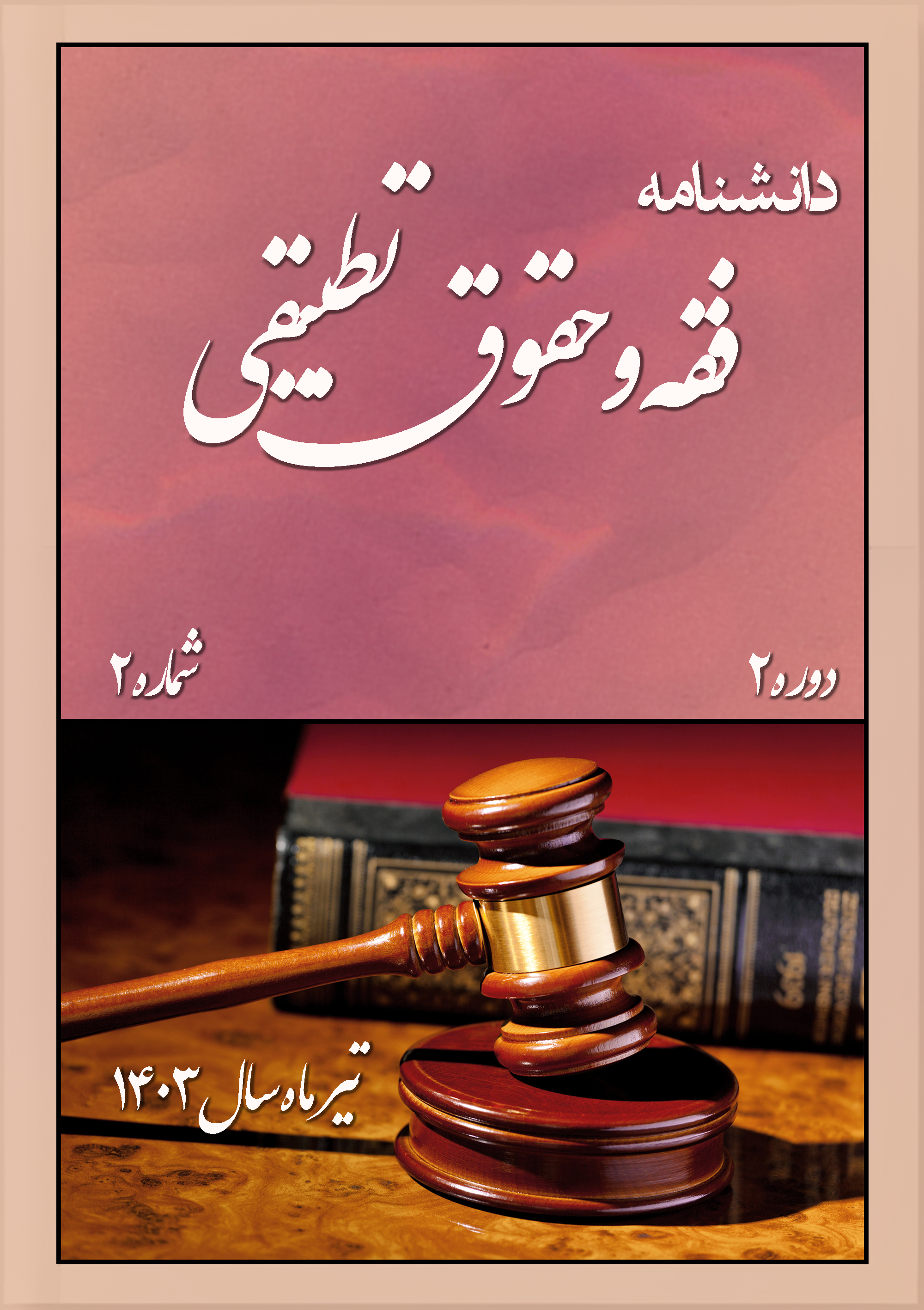Analysis of Jurisprudential and Historical Foundations of the Distinction Between Shar’i Ta'zir Punishments and Deterrent Punishments in the Penal Policy of the Islamic Republic of Iran
Keywords:
Sharia punishments, deterrent punishments, Shiite jurisprudence, criminal policy, Islamic Republic of Iran, jurisprudential foundationsAbstract
This article analyzes the jurisprudential and historical foundations underlying the distinction between shar’i ta'zir punishments and deterrent punishments within the penal policy of the Islamic Republic of Iran. The primary objective of this research is to elucidate the theoretical and practical origins of these two penal institutions and to examine their implications for Iran’s legislative and judicial systems. The research method employed in this study is descriptive-analytical and is based on the examination of jurisprudential sources, hadiths, juristic opinions (fatāwā), and a comparative analysis of Iran’s criminal laws. The findings of the study indicate that shar’i ta'zir punishments are grounded in scriptural texts and jurisprudential reasoning, and apply to offenses for which no specific ḥadd punishment is prescribed in Islamic law. The determination of the type and severity of punishment in these cases, while adhering to the principles of Sharia and reformative considerations, lies within the discretion of the Islamic ruler. In contrast, deterrent punishments are established based on considerations of public interest and governmental necessity, with the aim of maintaining public order and social security. Their legitimacy is derived from the authority of the Islamic ruler and the doctrine of Wilāyat al-Faqīh (Guardianship of the Islamic Jurist). The historical analysis reveals that the separation and distinction between shar’i ta'zir and deterrent punishments is not a phenomenon that emerged abruptly with the Islamic Revolution or its aftermath in Iranian penal policy. Rather, this distinction has deep historical roots and is interwoven with the fabric of Shi'a jurisprudence and governmental jurisprudence (fiqh ḥukūmatī), evolving in response to the need for addressing newly arising criminal phenomena.
Downloads
References
Abrahamian, E. (2010). A History of Modern Iran.
Ahmadi, A. (2017). Islamic Penal Code of 2013 in the Current Legal Order. Jungle Publications.
Al-Fakhouri, H., & Al-Jar, K. (2023). History of Islamic Philosophy.
Amid Zanjani, A. (2012). Rules of Criminal Jurisprudence (Vol. 1).
Ardebili, M. A. (2017). General Criminal Law (Vol. 3). Mizan Publications.
Bayat, Z. (2014). Getting to Know Islamic Punishments. Firooz Publications.
Emami, M. (2007). Jurisprudence in the View of Intellectuals (2). Jurisprudence of Ahl al-Bayt, 13(51).
Eslami, S. H. (2015). Rules of Criminal Jurisprudence (Vol. 1).
Farahani Abhari, S. M. (2015). The Rule of Precaution in Implementing Hudud Qom.
Goldouzian, I. (2017). Essentials of General Criminal Law. Mizan Publications.
Gorji, A. (2002). History of Jurisprudence and Jurists. Andisheh Publications.
Haghighat, S. S. (2009). Shi'ism and Secularism: Political and International Approaches. Law Quarterly(18).
Hashemi Shahroudi, S. M. (2002). Essentials of Criminal Jurisprudence (Vol. 1).
Hashemi, S. M. A. (2009). The Rule of 'Ta'zir Below Hudud'. Jurisprudence of Ahl al-Bayt, 15(57).
Hosseini, S. M. (2008). Hudud and Ta'zir: Scope, Types, and Rulings. Law Quarterly, 38(1).
Jafari, H. (2017). A Reflection on the Scope of the Jurisprudential Rule 'Ta'zir for Every Forbidden Act'. Scientific and Research Quarterly of Jurisprudential and Principles Studies, 3(4).
Jafarian, R. (2014). Sources of Shi'a Political Thought and Jurisprudence During the Safavid Era. Islamic Government, 6(3).
Kalantari, A. A. (2004). Expediency in Shi'a Jurisprudence and Responses to Intellectual Doubts. Jurisprudence (A New Exploration in Islamic Jurisprudence)(36).
Masoudi Maqam, G. (2014). The Rule of Precaution in Bloodshed, Lives, and Implementing Hudud Qom.
Mehrpour, H. (2019). The History of Ta'zir Punishments: Imam Khomeini's Response to Ayatollah Ardebili's Inquiry. Bar Association Journal(147).
Mir Mousavi, S. A. (2011). Deconstructing the Old Power Structure in Contemporary Iran. Political Science, 6(2).
Mohaghegh Damad, S. M. (2009). Jurisprudential Rules. Center for Islamic Sciences Publications.
Mohaghegh Damad, S. M. (2017). Rules of Criminal Jurisprudence (Vol. 1).
Moshkat, S. M. R. (2013). Implementing Hudud During the Absence of the Infallible Imam (AS)
Nobahar, R. (2016). Rules of Criminal Jurisprudence.
Nourbaha, R. (2008). Foundations of General Criminal Law. Ganj Danesh Publications.
Nouri Alaa, E. (2012). Political Sociology of Twelver Shi'ism.
Rahimi, M. (2009). The Constitutionalism That Was: A Critique of Ahmad Tavakoli's Book 'The Constitutionalism That Wasn't'. Political-Economic Quarterly(143).
Sadeghi, H. (2011). Rational and Quranic Arguments on the Intrinsic and Rational Goodness and Evil of Actions. Knowledge of Theology, 2.
Sadeghi, M. H. (2023). General Criminal Law (3).
Salehi, S. M. (2017). Reflection on the Rule 'Ta'zir for Every Sin'. Quarterly Journal of Jurisprudence and Principles, 48(107).
Sarami, S. (2013). Hisbah as a Governmental Institution.
Sarikhani, A., & Akrami, R. (2013). Jurisprudential and Legal Examination of Ta'zir Punishments with Emphasis on the 2013 Islamic Penal Code. Criminal Law Research Journal, 5(2).
Sarikhani, A., & Aqababaei Bani, E. (2014). Exploring Jurisprudential Evidence for Ta'zir Executions. Criminal Law Research Journal(8).
Sharifi, S. (2024). Explicitly Stated Ta'zir Punishments. www.scienceoflaw.ir
Shiri, A. (2010). The Fall of Punishment in Islamic and Iranian Criminal Law.
Shokri, R., & Qader, S. (2017). General Criminal Law (Vol. 3).
Soltani, A., & Soleimani, H. (2015). A Reflection on the Jurisprudential Foundations of Repeated Ta'zir Executions. Journal of Islamic Jurisprudence and Law Studies, 7(12).
Tabrizi, J. (1997). Foundations of Hudud and Ta'zir Punishments. Society of Teachers Publications.
Yazdaniyan, T. (2013). Statute of Limitations in the 2013 Islamic Penal Code
Downloads
Published
Submitted
Revised
Accepted
Issue
Section
License
Copyright (c) 1404 مرضیه مولایی, عباسقلی انصاری, رحمت فرحزادی (نویسنده)

This work is licensed under a Creative Commons Attribution-NonCommercial 4.0 International License.










